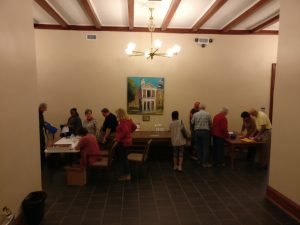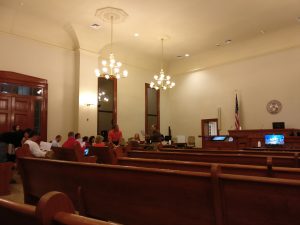With all 18 voting precincts in Lafayette County reporting, Republican nominee Donald Trump carried 55 percent of the vote.
Trump collected approximately 9,710 votes compared to the Democratic ticket of Hillary Clinton and Tim Kaine picking up 7,038. There are 32,899 registered voters in the county, with over 17,000 voters casting a ballot in this 2016 general election. Several news outlets called the state of Mississippi in favor of a Trump win early after the polls closed at 7 p.m.
Rewinding to earlier today, precincts like the one at the Stone Center saw a steady stream of voters coming in and out of the red-tinned building, those of which included Ole Miss Vice Chancellor for Intercollegiate Athletics, Ross Bjork, and Men’s Basketball Coach, Andy Kennedy. The Washington Avenue station saw its busiest time during the early morning hours between seven and nine.
“Most people that talked to me just said, ‘I just wish this election will end’,” Paige Romoser, 20, a first-time volunteer poll worker at the Stone Center said. “It wasn’t like people were excited to go out and vote for their specific candidate. People did not seem to be gung-ho about voting today.”
Alongside several other poll station workers, Romoser was tasked with verifying identification of voters, and then
While the movement of citizens in and out was smooth during the 12 hour voting period, it was not without a few hiccups. Under election code rules, when entering a voting site, one cannot wear attire in support or against a certain candidate. In 1992 the U.S. Supreme Court ruled that a 100-foot “campaign free zone” surrounding polling locations was not a restriction to First Amendment rights, according to USA Today.
“Today one voter came in with his two young children who had Trump shirts on,” Romoser said. “If you come in with it [a political piece of clothing] they have to tell you to leave or turn it inside out if you want to vote, and even though the kids weren’t voting they were asked to wait outside. He [the dad] cause a large scene about it.”
 The children did eventually leave the polling room, and waited outside. However, this was not the only issue to arise. One woman asked to vote via paper ballot, instead of electronically, and the Stone Center did not have any to meet her legal request.
The children did eventually leave the polling room, and waited outside. However, this was not the only issue to arise. One woman asked to vote via paper ballot, instead of electronically, and the Stone Center did not have any to meet her legal request.
“You’re technically supposed to allow people to do paper ballots if they want to, and that caused a huge issue,” Romoser said. “She had to vote electronically, because she had already signed the book saying she was going to vote, and you have to vote after you sign the book.”
Romoser noted that she has never seen an election up close, where she had a direct hand in the process. She gained a new respect for people who choose to exercise their right to vote, and the lengths they go to make sure their voice is heard.
“The range of people I saw come in, and the people that took so much effort to make sure they got their votes in, really interested me,” Romoser said. “There were people with two sleeping babies and still voted. I didn’t realize people cared that much.”
This election process impacted Romoser in a way she didn’t expect, and garnered for her a new appreciation for the democratic voting process.
“I probably would work again during polling,” Romoser said. “It was cool to be a part of the election process though it was the most hellish 13 hours of my life.”
Zachary Shaw